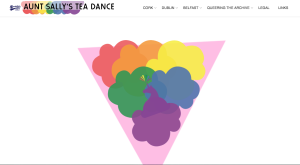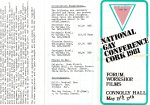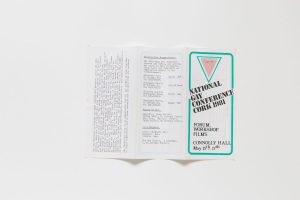
Collaboration, openness and sharing are key operating principles of Digital Humanities. “Collaboration is widely considered to be both synonymous with and essential to Digital Humanities (DH).” Julianne Nyhan and Oliver Duke Williams Such a spirit of collaboration and openness guides my work in developing the Cork LGBT Archive. I am lucky to have access to a rich source of materials in the Arthur Leahy Collection and other smaller collections of documents, posters, newsletters and other items relating to the rich history of the Cork LGBT community. See my earlier post on the archive here. The Cork LGBT Digital Archive aims to preserve these materials and to make them accessible and available through sharing them on www.corklgbtarchive.com

Alisha and Josef
This commitment to collaboration led me to engage recently with the Exhibitionist Society – a group of third year photography students from the Dublin Institute of Technology. “The Exhibitionist’s Society in Dublin Institute of Technology was established in 2016 with the central aim of creating an environment where students who have an interest in the Arts can work collaboratively with others, both inside and outside the college environment. This will allow students to build networks and connections while working creatively, utilising space and establishing their working practices.”

Alisha and Josef
One of the members of the Exhibition Society, Alisha Doody, was aware of my work in developing the Cork LGBT Archive and contacted me to ask if I would collaborate with them on a group project. Alisha and Joesf Kovac visited the archive on 29 February to explore the materials, and Josef returned a few weeks later to photograph some items for their exhibition.
It was really exciting for me to see how these talented photographers engaged with the materials in a

Josef Kovoc
different way to me – how they explored them from a different perspective, through a new lens and to see how they focused on image and content and symbolism.
The Exhibitionist Society also engaged with the National Photographic Archive and with Belfast Exposed. They developed a website Aunt Sally’s Tea Dance in which they displayed and  engaged with the materials found in the various archives. It is a fresh and dynamic perspective on LGBT history. “Aunt Sally’s Tea Dance deals with the politics of the archive and the subsequent visibility or invisibility of LGBT identity and queer Ireland by looking at the collected material in three archives, well established and in development……This website developed to present the findings from our engagement with the archives, archivists, researchers and curators. We focused on ephemera and photographs relating to ‘parade’ and ‘community’ to inquire how photography has been used to activate public attention, change public opinion and re-present LGBT movements and much of this material has not been exhibited in the public domain before.”
engaged with the materials found in the various archives. It is a fresh and dynamic perspective on LGBT history. “Aunt Sally’s Tea Dance deals with the politics of the archive and the subsequent visibility or invisibility of LGBT identity and queer Ireland by looking at the collected material in three archives, well established and in development……This website developed to present the findings from our engagement with the archives, archivists, researchers and curators. We focused on ephemera and photographs relating to ‘parade’ and ‘community’ to inquire how photography has been used to activate public attention, change public opinion and re-present LGBT movements and much of this material has not been exhibited in the public domain before.”
 Last night I attended the launch of the website at the new Brunswick Collective in Dublin. It was wonderful to walk in and see images from the Cork LGBT Archive displayed on the walls, including a giant copy of the poster for the third National Lesbian and Gay Conference in 1983.
Last night I attended the launch of the website at the new Brunswick Collective in Dublin. It was wonderful to walk in and see images from the Cork LGBT Archive displayed on the walls, including a giant copy of the poster for the third National Lesbian and Gay Conference in 1983.

Scan of leaflet
One wall held a display of items from the Cork archive. It was so interesting to see items with which I am so familiar, displayed in such a different way. One example is the leaflet for the first National Gay Conference in Cork in 1981. I have scanned this item, providing a clear image in which the text can easily be read. This has then been uploaded to the Cork LGBT Archive with attached metadata.

Josef Kovac photo
While clear and legible, the scan of the leaflet produced a flat image. Josef Kovac photographed the same leaflet and this was displayed last night. His image is much more three dimensional than the scan – it makes you want to reach out and pick up the leaflet. For me this showed so clearly the importance and benefits of enabling different people with different skills and perspectives to engage with the materials in the archive.
Another tangible benefit of the collaboration is that the Exhibitionist Society are going to donate the mounted photographs to the Cork LGBT Archive – a great start to building an exhibition for the archive. And there are promises of further collaboration in extending this exhibition material!
Congratulations to all in the Exhibitionist Society for your work in creating Aunt Sally’s Tea Dance.
Here is a link to a video of some of my speech at the launch of Aunt Sally’s Tea Dance on 28 April 2016 – apologies for the poor quality but at least it gives a flavour of the event. (The video is in two parts.)
